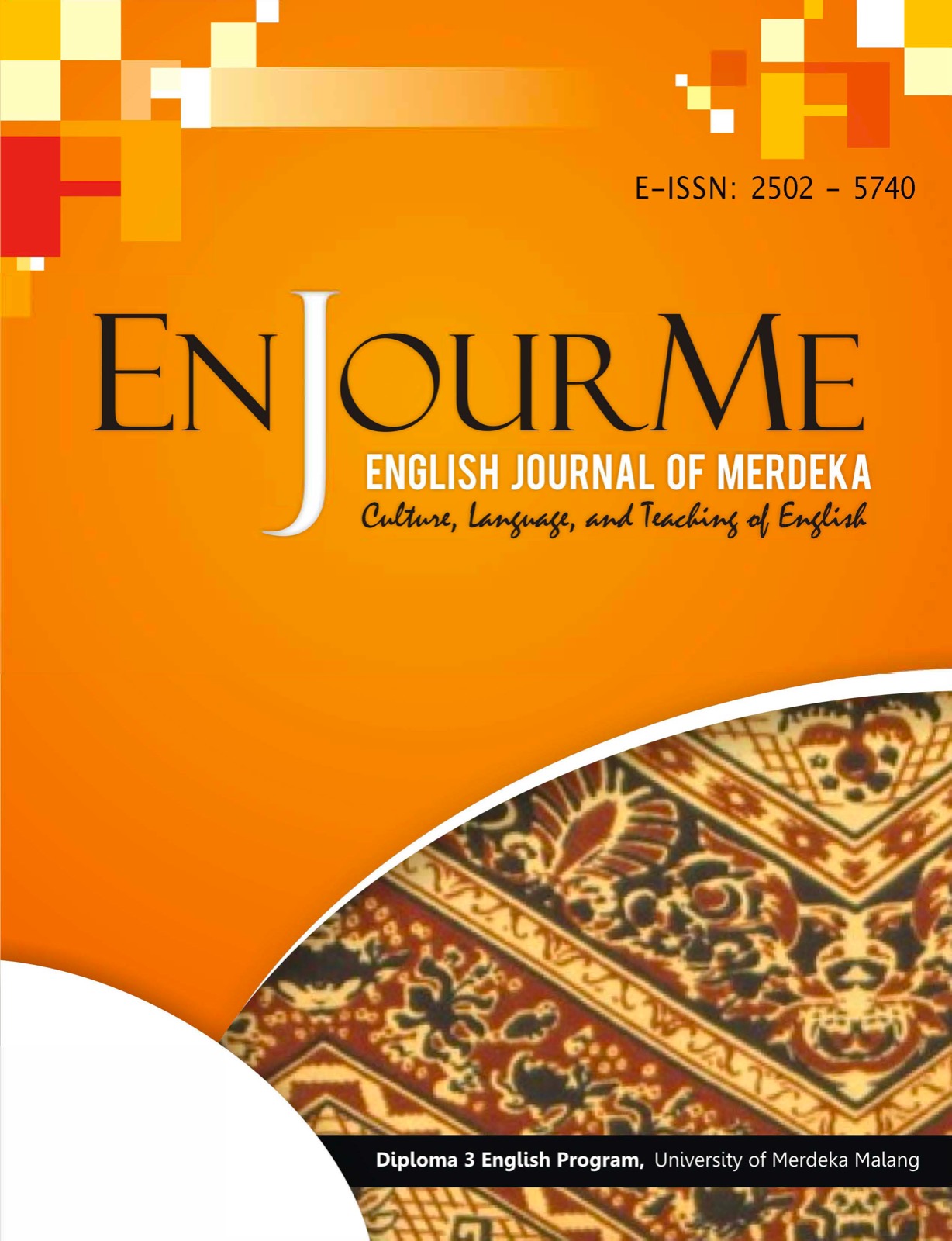An Indonesian EFL teacher’s perspective in selecting and developing intercultural content for English Language Teaching
DOI:
https://doi.org/10.26905/enjourme.v8i2.11686Keywords:
English as a Foreign Language, English Language Teaching, Materials Development, TextbookAbstract
While an extensive body of research has focused on examining and discussing how intercultural values are integrated into English Language Teaching (ELT) materials, little is known about how individual teachers select and develop intercultural content. The present study aimed at exploring an Indonesian EFL teacher’s perspective in selecting and developing intercultural content for classroom instruction. The participant was an English teacher in a state high school in Yogyakarta, Indonesia with more than 10 years of teaching experience. The data from in-depth interviews and the participant’s teaching artifacts were analyzed thematically to point out the participant’s perspective based on multiple aspects. The findings indicated that the participant’s selection and development of intercultural content involved various aspects, including the participant’s beliefs and values, the students, curricular requirements, and influence from colleagues. This study provides an insight into the practical implementation of intercultural value integration into English language instruction in Indonesia.Downloads
References
Akkari, A., & Radhouane, M. (2022). Multicultural Education in the United States. Intercultural Approaches to Education, (pp. 65–78). https://doi.org/10.1007/978-3-030-70825-2_5
Ball, D. L., & Feiman-Nemser, S. (1988). Using textbooks and teachers’ guides: A dilemma for beginning teachers and teacher educators. Curriculum Inquiry, 18(4), 401–423. https://doi.org/10.1080/03626784.1988.11076050
Bennett, M. J. (1986). A developmental approach to training for intercultural sensitivity. International Journal of Intercultural Relations, 10(2), 179–196. https://.1016/0147-1767(86)90005-2
Bennett, M. J. (2004). Developing intercultural sensitivity: An integrative approach to Global and Domestic Diversity. Handbook of Intercultural Training, (pp. 147–165). https://doi.org/10.4135/9781452231129.n6
Bennett, M. J. (2004) Becoming interculturally competent. In: Wurzel, J.S., Ed., Toward Multiculturalism: A Reader in Multicultural Education, Intercultural Resource Corporation, Newton.
Bennett, M. J. (2009). Defining, measuring, and facilitating Intercultural Learning: A conceptual introduction to the intercultural education double supplement. Intercultural Education, 20(sup1), S1-S13, doi: https://doi.org/10.1080/14675980903370763
Berger, P., and T. Luckmann. 1967. The social construction of reality: A treatise in the sociology of knowledge. Garden City, NJ: Anchor.
Braun, V., & Clarke, V. (2012). Thematic analysis. In H. Cooper, P. M. Camic, D. L. Long, A. T. Panter, D. Rindskopf, & K. J. Sher (Eds.), APA handbook of research methods in psychology, Vol. 2. Research designs: Quantitative, qualitative, neuropsychological, and biological (pp. 57–71). American Psychological Association. https://doi.org/10.1037/13620-004
Ghavamnia, M. (2020). Iranian EFL teachers’ beliefs and perspectives on incorporating culture in EFL classes. Intercultural Education. DOI: 10.1080/14675986.2020.1733862
Lavrenteva, E., & Orland-Barak, L. (2020). Teaching culture in the EFL classroom as informed by teachers’ approaches to student diversity. Research Papers in Education, 37(5), 633–666. https://doi.org/10.1080/02671522.2020.1864763
Liddicoat, A. J., & Crozet, C. (Eds.). (1997). Teaching Language, Teaching Culture. Canberra: Applied Linguistics Association of Australia.
Liddicoat, A. J. (2004) Intercultural language teaching: Principles for practice New Zealand Language Teacher. 30:17-24.
Liddicoat, A. J. (2006). Learning the culture of interpersonal relationships: Students’ understandings of person reference in French. Intercultural Pragmatics, 6(1), 55-80.
Liddicoat, A. J. (2009). Communication as culturally contexted practice: A view from intercultural communication. Australian Journal of Linguistics, 29(1), 115-133.
Liddicoat, A. J. (2017). Interpretation and critical reflection in intercultural language learning: Consequences of a critical perspective for the teaching and learning of pragmatics. In M.
Dasli & A. DÃaz (Eds.), The critical turn in language and intercultural communication pedagogy: Theory, research and practice (pp. 22-39). London & New York: Routledge.
Liddicoat, A. J. (2020). Teaching languages from an intercultural perspective: rethinking the nature of learning. In: Arber, Ruth and Weinmann, Michiko and Blackmore, Jillian, (eds.) Rethinking Languages Education: Directions, Challenges and Innovations. New York: Routledge. ISBN 9781138091580
Maguire, M., & Delahunt, B. (2017). Doing a Thematic Analysis: A Practical, Step-by-Step Guide for Learning and Teaching Scholars. All Ireland Journal of Teaching and Learning in Higher Education (AISHE-J), 8(3).
Miftakh, F. (2017). Intercultural English Teaching and Learning to Young Learners. Proceedings of the Fifth International Seminar on English Language and Teaching (ISELT-5).
Nguyen, L., Harvey, S., & Grant, L. (2016). What teachers say about addressing culture in their EFL teaching practices: The Vietnamese context. Intercultural Education, 27(2), 165–178. https://doi.org/10.1080/14675986.2016.1144921
Romijn, B. R., Slot, P. L., & Leseman, P. P. M. (2021). Increasing teachers’ intercultural competences in teacher preparation programs and through Professional Development: A Review. Teaching and Teacher Education, 98, 103236. https://doi.org/10.1016/j.tate.2020.103236
Scarino, A., A., S., & J., L. A. (2009). Teaching and learning languages: A guide. Curriculum Corporation.
Siddiqie, S. A. (2011). Intercultural exposure through English language teaching: An analysis of an English language textbook in Bangladesh. Journal of Pan-pacific Association of Applied Linguistics, 15(2), 109-127.
Sugianto, A. (2022). English Teachers’ Reflections of the Integration of Intercultural Competence Into Their Teaching Practices: What and How?. Musamus Journal of Language and Literature. 4(1), 2622-7843.
Triandis, H. C. (1994). Culture and social behavior. New York: McGraw-Hill.
Walters, L. M., Garii, B., & Walters, T. (2009). Learning globally, teaching locally: Incorporating International Exchange and intercultural learning into preâ€service teacher training. Intercultural Education, 20(sup1). https://doi.org/10.1080/14675980903371050
Additional Files
Published
How to Cite
Issue
Section
License
Authors who publish with this journal agree to the following terms:
(1) Copyright of the published articles will be transferred to the journal as the publisher of the manuscripts. Therefore, the author confirms that the copyright has been managed by the journal.
(2) Publisher of EnJourMe (English Journal of Merdeka) : Culture, Language, and Teaching of English is University of Merdeka Malang.
(3) The copyright follows Creative Commons Attribution–ShareAlike License (CC BY SA): This license allows to Share — copy and redistribute the material in any medium or format, Adapt — remix, transform, and build upon the material, for any purpose, even commercially.




